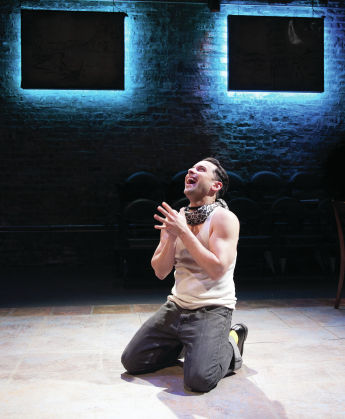
If our story's premise was that of a maiden forced into a marriage against her wishes, we'd be in her corner immediately, but when a young bachelor is bestowed in matrimony by his king as a reward to the prospective bride, the tale is labeled a "problem play" and its dynamic reduced to a case study in misogynistic codependency. To be sure, the reluctant groom protests his duty most unceremoniously, but Shakespeare scholars might recall that Katherine the Shrew was hardly a compliant newlywed, either.
The dilemma facing the untimely-matched spouses arises, first and foremost, from class differences. Orphaned Helena, a doctor's daughter, is in love with Bertram, her guardian's nobly born son. After curing the king of a fatal disease, her grateful patient offers his physician, in payment for her services, her choice of a husband.
The rebellious Bertram promptly joins an army preparing to deploy for foreign posts, leaving his wife to languish in unconsummated marital limbo. Undaunted by this rejection, Helena follows her spouse to the Italian wars, where she contrives to win his acceptance through cleverness and sheer perseverance.
Matches rooted in government coercion and fulfilled by attrition still sit uneasily with modern audiences, so how does Stage Left director Drew Martin propose to render his text's 17th-century gender politics palatable? By surrounding them in a decor most aptly dubbed "Fantasy Mafia." The Paris court of this All’s Well that Ends Well affects roaring-'20s motifs, with guards wielding tommy-guns and a monarch sporting a chalk-stripe three-piece and Borsalino hat, while the city of Florence, where Bertram's hit squad is billeted, looks suspiciously like Miami in the early 1960s, the mini-dresses of its female denizens contrasting with Helena's prim kilts and sweater-sets. Within this cartoon universe, Helena's pursuit of the not-yet-ready-to-settle-down Bertram takes on the playfulness of a giddy-young-lovers comedy—just like its author always said it was.
The task of imposing dialects ranging from “Little Caesar” to “I Love Lucy” upon Shakespeare's classic prose meets with varied levels of success. Coming off the most verbally adept are Rich Logan's Royal Highness and Heather Chrisler's Diana, though Jeremy Trager lends a plummy swagger to the role of the boastful Parolles, Sean Sinitski endows the witty Lavatch with suave urbanity, as do Susie Griffith and Kimberly Logan as a pair of spritely matriarchs. The real star of the show, however, is Jeffrey Levin's ebullient score of Sinatra-era pop. Playgoers unafraid of revealing their age are welcome to sing along during the intermission.
